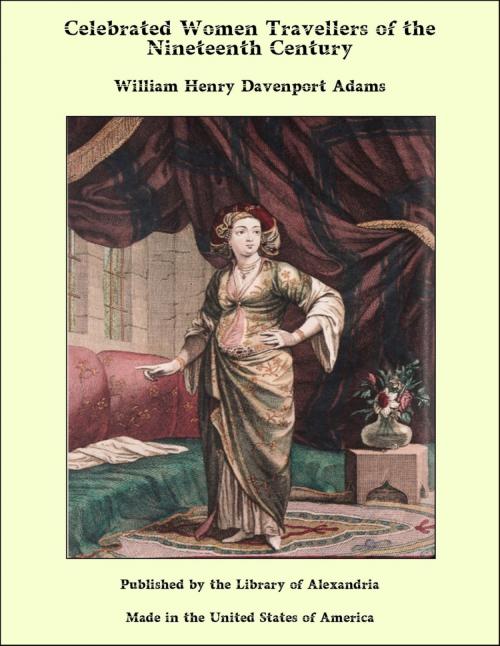Celebrated Women Travellers of the Nineteenth Century
Nonfiction, Religion & Spirituality, New Age, History, Fiction & Literature| Author: | William Henry Davenport Adams | ISBN: | 9781465616456 |
| Publisher: | Library of Alexandria | Publication: | March 8, 2015 |
| Imprint: | Language: | English |
| Author: | William Henry Davenport Adams |
| ISBN: | 9781465616456 |
| Publisher: | Library of Alexandria |
| Publication: | March 8, 2015 |
| Imprint: | |
| Language: | English |
The Princess Helena Koltzoff-Massalsky, better known by her pseudonym of Dora d'Istria, came of the family of the Ghikas, formerly princes of Wallachia, and was born at Bucharest, on the 22nd of January, 1829. Through the care and conscientiousness of her instructor, Mons. Papadopoulos, and her own remarkable capacity, she acquired a very complete and comprehensive education. When but eleven years old, she composed a charming little story, and before she had reached womanhood, undertook a translation of the Iliad. She showed no inclination for the frivolous amusements of a frivolous society. Her view of life and its responsibilities was a serious one, and she addressed all her energies to the work of self-improvement and self-culture. She read and re-read the literary masterpieces of England, France and Germany. As a linguist she earned special distinction. "Her intellectual faculties," says her master, M. Papadopoulos, "expanded with so much rapidity, that the professors charged with her instruction could not keep any other pupil abreast of her in the same studies. Not only did she make a wholly unexpected and unhoped-for progress, but it became necessary for her teachers to employ with her a particular method: her genius could not submit to the restraint of ordinary rules." She was still in the springtime and flush of youth, when she went on a tour to Germany, and visited several German courts, where she excited the same sentiments of admiration as in her own country; it was impossible to see her without being attracted by so much intellect, grace and amiability. Travelling enlarged her horizon: she was able to survey, as from a watch-tower, the course of great political events, and she found herself mixing continually with the most celebrated savants and statesmen of the age. Her friendly relations with persons of very diverse opinions, while enabling her to compare and contrast a great variety of theories, did but strengthen in her "the idea and sentiment of liberty, which can alone conduct society to its true aim." Finally, from the Italian revolution of 1848, which awoke her warmest sympathies, she learned to understand the fatal consequences of despotic government, as well as the inevitable mistakes of freedom, when first unfettered and allowed to walk alone.
The Princess Helena Koltzoff-Massalsky, better known by her pseudonym of Dora d'Istria, came of the family of the Ghikas, formerly princes of Wallachia, and was born at Bucharest, on the 22nd of January, 1829. Through the care and conscientiousness of her instructor, Mons. Papadopoulos, and her own remarkable capacity, she acquired a very complete and comprehensive education. When but eleven years old, she composed a charming little story, and before she had reached womanhood, undertook a translation of the Iliad. She showed no inclination for the frivolous amusements of a frivolous society. Her view of life and its responsibilities was a serious one, and she addressed all her energies to the work of self-improvement and self-culture. She read and re-read the literary masterpieces of England, France and Germany. As a linguist she earned special distinction. "Her intellectual faculties," says her master, M. Papadopoulos, "expanded with so much rapidity, that the professors charged with her instruction could not keep any other pupil abreast of her in the same studies. Not only did she make a wholly unexpected and unhoped-for progress, but it became necessary for her teachers to employ with her a particular method: her genius could not submit to the restraint of ordinary rules." She was still in the springtime and flush of youth, when she went on a tour to Germany, and visited several German courts, where she excited the same sentiments of admiration as in her own country; it was impossible to see her without being attracted by so much intellect, grace and amiability. Travelling enlarged her horizon: she was able to survey, as from a watch-tower, the course of great political events, and she found herself mixing continually with the most celebrated savants and statesmen of the age. Her friendly relations with persons of very diverse opinions, while enabling her to compare and contrast a great variety of theories, did but strengthen in her "the idea and sentiment of liberty, which can alone conduct society to its true aim." Finally, from the Italian revolution of 1848, which awoke her warmest sympathies, she learned to understand the fatal consequences of despotic government, as well as the inevitable mistakes of freedom, when first unfettered and allowed to walk alone.















